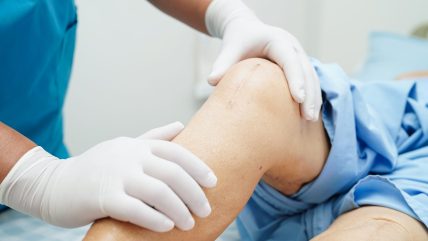
A study determining that robotic assistance in knee replacement surgeries does not improve revision rates two years following surgery has been presented at AAOS 2024 in San Francisco.
Researchers used the American Joint Replacement Registry to identify patients who underwent total knee arthroplasty (TKA), otherwise known as a knee replacement, between January 2017 and March 2020 with a minimum two-year follow-up. The research, published in Clinical Orthopaedics and Related Research, found that robotic assistance did not significantly affect the risk of revision.

Discover B2B Marketing That Performs
Combine business intelligence and editorial excellence to reach engaged professionals across 36 leading media platforms.
The study focused on patients aged 65 and older, totalling 9,220 cementless TKA’s – 45% of which were performed using robotic assistance. The study compared outcomes of cementless TKA with and without robotic assistance, finding similar rates of all-cause revision at two years post-surgery between conventional and robotic-assisted cohorts. The odds of revision due to infection and mechanical loosening were not significantly different between the two groups.
According to a report on GlobalData’s Medical Intelligence Center, the medical robotics market is forecast to be worth $14.5bn in 2030, growing at a compound annual growth rate (CAGR) of 12% from $4.7bn in 2020.
GlobalData is the parent company of Clinical Trials Arena.
In the announcement accompanying the data, assistant professor of orthopaedic surgery at Johns Hopkins Medicine, Lucas Nikkel said: “We found there was no significant differences in the risk of needing another operation within the first two years after surgery with a robotic-assisted or manual technique.

US Tariffs are shifting - will you react or anticipate?
Don’t let policy changes catch you off guard. Stay proactive with real-time data and expert analysis.
By GlobalData“This is significant in this population as the likelihood of an early failure is pretty much the same whether robotic assistance is used or not. Some patients desire a robotic-assisted TKA because they’ve heard it is better, but we’ve shown that there isn’t a true benefit in terms of the likelihood of needing another surgery in the early period.”
In June 2023, US-based medical device company THINK Surgical received 510(k) clearance from the US Food and Drug Administrationfor its TMINI robotic system for knee replacement surgery. The device, which compensates for the surgeons’ hand movement, can be used by several different implant manufacturers.





